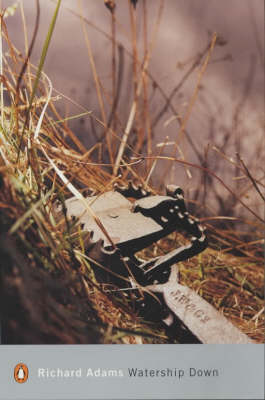Reviewed by Metaphorosis Reviews on
When young rabbit Fiver has a premonition, his friend Hazel convinces a few other rabbits to leave their warren and search for a safer home.
What can I say about Watership Down that you don't already know? It's a classic, a moving story of companionship and adversity, the spark for hundreds of imitators, and the benchmark against which they are held.
Richard Adams wasn't the first to write a talking-animal story, not by a long shot. Kenneth Grahame got there well before him, not to mention Aesop and a whole host of others. But he's the one who triggered a wave of copycats, many quite successful. Some of those copycat stories are quite good, but Watership Down is in a class by itself.
The book's well-deserved success rests on several fronts. Adams' rabbits are clearly drawn individuals, memorable, immediately recognizable, and, above-all, not human. Of course there's quite a bit of anthropomorphism in Adams' story, but the plain fact is that the characters here don't act like humans, but as credible, always-in-character rabbits. They worry like rabbits, they think like rabbits, they move like rabbits - at least, how we can believe rabbits might worry, think, and move. One never gets the feeling Adams' research was particularly exhaustive - he primarily cites one book - but he's both perceptive about what to take from it, and consistent in what he does with it. The result feels like a book about genuine rabbits, not humans in costume.
If the characters are credible, the relationships between them are the heart of the book. Weak, perceptive, otherwordly Fiver, plodding but thoughtful Hazel, stolid, determined Bigwig, focused Woundwort - we feel for all of Adams' key characters, and the interaction between them is genuinely moving. If you're not holding your breath at some points, and near tears at others, you're reading a different book.
Adams provides quite a lot of color through the interspersed tales of El-Ahrairah, legendary rabbit hero, and his loyal companion Rabscuttle. They're long, but remarkably fun diversions from the main story, and tied into it very cleverly. A few neologisms are used to good effect as well - forty years since we first read this as a family, my mother still remembers that 'silflay' means to eat grass.
Adams views about human activity come through clearly - destruction of the environment, safety at the expense of liberty, and a host of other evils come in for criticism - but, astoundingly, without interfering with the story. In fact, they enhance it.
Adams does somewhat less well with other species. They play mostly small roles, and he's assigned each species accents drawn from stereotyped human foreigners, a touch that falls flat today. More problematic is the relatively minor role of female rabbits. While there are a few individuals, the does are largely treated as an adjunct of rabbit life - needed for mating and for digging good burrows. At the time, I took this as a reflection of rabbit society, but it's been argued that rabbits are in fact quite matriarchal. Given that the book was written relatively recently, in the 1970s, there's not a good argument for change of culture as an excuse. These flaws make the book imperfect, but it remains head and shoulders above most alternatives.
If you haven't read this book, do it now; you're in for a terrific treat. If you have, re-read it; it's as good as you remember. If you've already re-read it, there's an even brighter side - Adams was not a one-shot author. He has quite a few other books just as well written, just as moving, just as effective. I highly recommend The Plague Dogs (it may genuinely have changed my life), Maia, and Shardik at the least.
Reading updates
- Started reading
- 1 January, 1974: Finished reading
- 1 January, 1974: Reviewed
